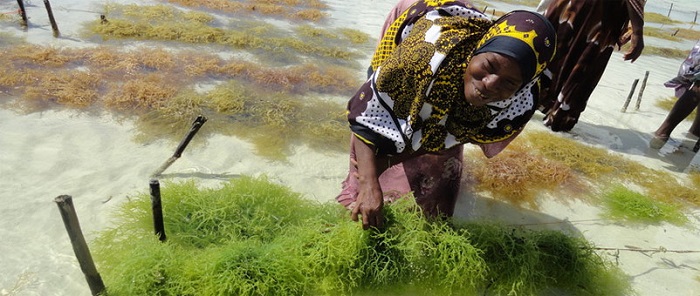Zanzibar’s seaweed farming industry, a lifeline for thousands of women in the region, is under threat due to rising ocean temperatures.
The warming waters, a consequence of global climate change, are severely affecting the cultivation of seaweed, particularly the Eucheuma species, which requires cooler temperatures to flourish.
As the ocean heats up, these delicate plants are increasingly unable to survive, leading to a decline in seaweed production and threatening the livelihoods of the women who depend on this trade.
For decades, seaweed farming has been a cornerstone of Zanzibar’s economy, providing income and economic independence to many coastal women.
Traditionally, the seaweed is farmed in shallow waters, where it is easy to plant and harvest. However, with temperatures on the rise, these shallow farming areas are becoming inhospitable.
The once-thriving seaweed is now wilting under the heat, prompting farmers to consider relocating their farms to deeper, cooler waters.
This shift, while necessary, is fraught with challenges. Farming in deeper waters requires new skills, equipment, and a higher level of physical exertion.
The women, many of whom have farmed seaweed their entire lives, must now adapt to these new conditions or risk losing their livelihoods.
The financial burden of purchasing equipment and the need for specialized training add to the difficulties they face.
Despite these obstacles, the women of Zanzibar are showing remarkable resilience. They are not only exploring deeper waters but also experimenting with more heat-resistant seaweed varieties that can withstand warmer temperatures.
Some farmers are collaborating with scientists, environmental groups, and local organizations to develop sustainable farming practices that can endure the changing climate.
In addition to adapting their farming techniques, the women are also engaging in advocacy and education efforts to raise awareness about the impact of climate change on their industry.
They are pushing for greater support from the government and international community to help them transition to new methods and ensure the long-term sustainability of seaweed farming in Zanzibar.
The challenges faced by Zanzibar’s women seaweed farmers highlight the broader issue of climate change and its impact on vulnerable communities around the world.
Their determination to adapt and innovate in the face of adversity is a testament to their resilience and an example of how communities can come together to tackle the challenges posed by a changing environment.
As they continue to fight for their livelihoods, these women are also paving the way for a more sustainable future for the entire region.









